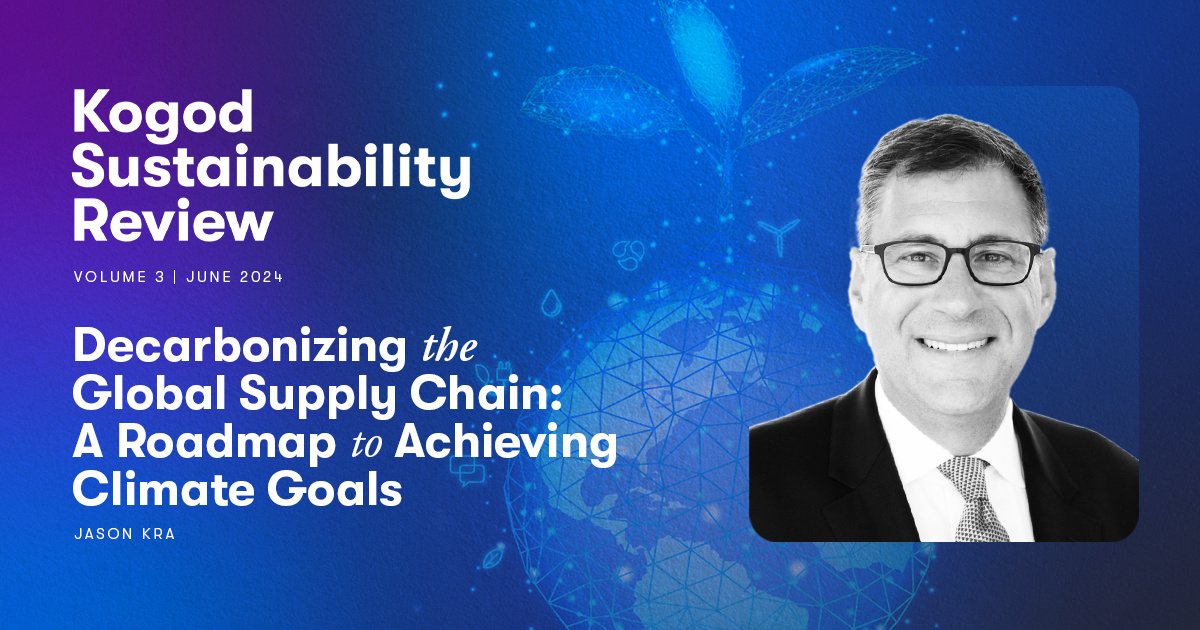
Jason Kra
President, Li & Fung
In the face of escalating environmental challenges, businesses worldwide recognize the urgent need to transform their operations and supply chains to become more sustainable and eco-friendly. The global supply chain, which encompasses the intricate network of processes involved in producing and distributing goods and services, significantly impacts the environment. As consumers become increasingly conscious of their carbon footprint, companies are pressured to adopt innovative methods that minimize their environmental impact while maintaining operational efficiency. This article explores cutting-edge approaches to creating a cleaner global supply chain, including adopting circular economy principles, leveraging advanced technologies, and equipping the next generation of business leaders with sustainability expertise.
Innovative Methods for a Cleaner Global Supply Chain
As the world grapples with the urgent need to combat climate change, businesses recognize the pivotal role of supply chain sustainability in achieving a cleaner, more resilient future. Innovative methods are being introduced to decarbonize global supply chains and minimize their environmental impact. One promising approach is the adoption of circular economy principles. Companies can significantly reduce waste and conserve natural resources throughout the supply chain lifecycle by designing products for longevity, reuse, and recyclability. In my industry, we see the repurposing of used clothing to recycle, a major emerging trend for luxury brands. Closed-loop manufacturing systems, where waste is repurposed as input for new products, are gaining traction across various industries.
Furthermore, leveraging advanced technologies like blockchain revolutionizes supply chain transparency and traceability. These tools provide real-time visibility into operations, enabling companies to identify inefficiencies, mitigate risks, and optimize resource allocation, ultimately reducing their carbon footprint. Technological innovation is the underlying force that unlocks advancements in a cleaner global supply chain.
A decarbonized global supply chain is critical in achieving global climate goals and mitigating the catastrophic impacts of climate change."

Jason Kra
President, Li & Fung
Decarbonized Supply Chains and Global Climate Goals
Supply chains account for significant greenhouse gas emissions, making their decarbonization essential for meeting emissions reduction targets. Energy production is the most polluting of all aspects of a supply chain, and the countries with the lowest-cost manufacturing have the least amount of renewable energy. Companies can substantially reduce their supply chain emissions by transitioning to renewable energy sources, implementing energy-efficient practices, and adopting sustainable transportation methods. Additionally, selecting your component suppliers close to the country where the final assembly takes place is a significant way to reduce the amount of carbon pollution in supply chains. As more businesses prioritize supply chain sustainability, the collective impact on global emissions reduction will be substantial, bringing us closer to achieving the goals set forth by the Paris Agreement and other international climate accords.
Equipping the Next Generation of Business Leaders
To ensure the continued momentum of sustainability initiatives, it is crucial to equip the next generation of business professionals with the knowledge and skills necessary to drive meaningful change within their organizations and communities. Sustainability is a lot more than just being green. It is about a commitment to a culture and value system in how firms produce and sell products based on the demands of today's consumers. Innovative academic programs are emerging to empower future leaders with a comprehensive understanding of sustainability challenges and equip them with the tools to develop and implement effective solutions. By fostering a culture of sustainability from the ground up, these educational initiatives will cultivate a workforce that is knowledgeable about environmental issues and passionate about driving positive change. This will enable businesses to integrate sustainability into their core strategies and operations, ensuring a more resilient and responsible future. In conclusion, innovative methods such as circular economy principles, advanced technologies, and collaborative partnerships pave the way for a cleaner global supply chain. A decarbonized supply chain is pivotal in achieving global climate goals, and equipping the next generation of business leaders with sustainability expertise will ensure the continued advancement of these critical initiatives.
In conclusion, pursuing a cleaner global supply chain is a multifaceted endeavor that requires a concerted effort from businesses, governments, and individuals alike. Innovative methods such as circular economy principles, advanced technologies, and collaborative partnerships pave the way for a more sustainable future. By embracing these approaches, companies can reduce their environmental impact and gain a competitive advantage in an increasingly eco-conscious market. Moreover, equipping the next generation of business leaders with sustainability expertise will ensure the continued advancement of these critical initiatives. A cleaner global supply chain represents a crucial step towards a more sustainable and resilient world for future generations.
